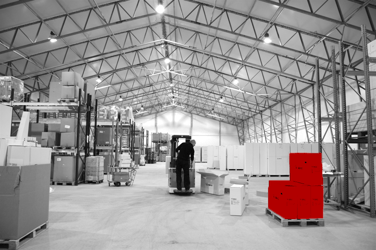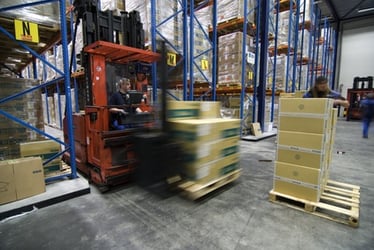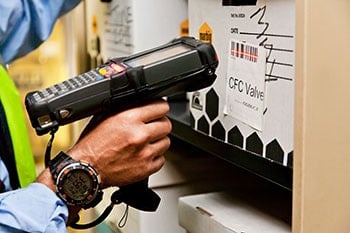 You have a new construction project that’s ready to break down. You have vendors ready to ship parts and materials, everything from steel and concrete down to nuts, bolts, and washers. Hundreds of vendors will be shipping thousands of parts to a location that was literally just created on a map.
You have a new construction project that’s ready to break down. You have vendors ready to ship parts and materials, everything from steel and concrete down to nuts, bolts, and washers. Hundreds of vendors will be shipping thousands of parts to a location that was literally just created on a map.
How will you receive those shipments, make sure they’re in good order, and get them to the right work station? There’s not a receiving system in place. There’s no dock, no technology, no receiving crew. You likely have a contractor or project manager onsite, but they’re busy with their own problems. Who’s watching the materials and routing them in an efficient manner?
If you have experience managing construction or other large-scale projects, you’ve seen this movie before. Materials get delivered but the end receiver doesn’t know they’ve arrived. Inaccurate shipments arrive, but no one notices until it’s too late. Workers whose time would be better spent elsewhere are pulled off their jobs to unload a truck.
These things happen, but they don’t have to.
We recently noticed the challenges that one of our customers was having with the materials process, so we developed a solution that has helped the company become more efficient, more accurate, and more profitable.
The customer develops and creates production lines for high-volume manufacturers, including some of America’s largest companies. They design automated and semi-automated production lines and then build and install those lines in their customer's’ facilities.
 As you can imagine, the assembly of automated production lines requires many parts and materials. Bearings, nuts, bolts, belts, and more have to be shipped from a variety of vendors to the customer’s location. Our customer then has to sort those materials, get them to the right workstations, and get the job done.
As you can imagine, the assembly of automated production lines requires many parts and materials. Bearings, nuts, bolts, belts, and more have to be shipped from a variety of vendors to the customer’s location. Our customer then has to sort those materials, get them to the right workstations, and get the job done.
There’s also no receiving process in place. This is a pop-up job. They set up camp in their customer’s facility for a few days, do the job, and get out. They have to establish a receiving process from scratch on every job.
In many instances, our customer is hiring a contractor to do much of the installation. That third party is there to do one job - install the equipment. They’re not there to receive materials, sort through crates, or distribute materials to the correct workstation.
Complicating matters is the fact that our customer deals with compacted timeframes. They’re assembling lines in their customer’s facility. The turnaround time is paramount. If an essential part is missing, that could throw off their entire schedule.
Also, they needed to use their team members to unload and sort the materials. Many of those team members are skilled and experienced technicians whose core competencies are line design and installation. Their talents are better served installing the line as quickly as possible, not unloading crates off of trucks.
Our customer knew they could work faster, smarter, and more profitably if they had a more efficient process for receiving materials. They turned to us for a solution.
We implemented a system where our team members show up onsite to receive all of their materials. We use our software, which integrates seamlessly with our customer’s own technical platform. The software gives us and the customer complete transparency, so we know exactly which parts should arrive at which facility, and when they should get there.
 When a container arrives, we scan it and unload it. The system is automatically updated so everyone knows the status of the shipment. We then scan each crate and, if necessary, scan each part or material inside of each crate. In some instances, we manage the entire process from the time the material leaves the vendor to the time it reaches its final workstation.
When a container arrives, we scan it and unload it. The system is automatically updated so everyone knows the status of the shipment. We then scan each crate and, if necessary, scan each part or material inside of each crate. In some instances, we manage the entire process from the time the material leaves the vendor to the time it reaches its final workstation.
An important step in this process is inspecting all shipments for non-conforming and damaged goods. We initiate the return merchandise authorization process as soon as we detect a product that doesn’t meet quality standards. We’re then able to get it replaced quickly, avoiding lengthy delays in the installation timeline.
This solution allows our customer to shift their team members away from the receiving dock and back onto the production floor. We get the parts where they need to be and the customer focuses solely on assembling their design. It allows them to spend their time, energy, and resources on doing what they do best, which is always a formula for more efficient work.

The service has been so successful that we are now opening it up to other manufacturing and industrial companies. We have four different levels of service available:
1. Container Management:
Our base level of service. We scan and check-in containers as they enter your facility. You can see in real time which shipments have made it through your doors. After we check-in the container, we hand it over to your team.
2. Handling Unit Management:
We check in containers, but then take it a step further. We also unload the containers, scan each individual crate, box, or other package, and then deliver those boxes to the appropriate work station.
3. Item Management:
In this level of service, we get down to the actual materials inside each crate. We scan each individual item so it shows up in our logistic software, which should integrate seamlessly with your platform. Whether it’s large equipment or parts as small as nuts and washers, we inventory all of it to make sure it’s accurate before delivering the parts to their final destination.
4 . All-Inclusive Logistics Management:
Our most comprehensive service. In this package, we offer pre-shipment and transportation visibility, meaning we will monitor the materials before they leave the vendor and as they are en route to your facility.
In all of these packages, we inspect for quality so we can identify errors and dysfunctional parts as soon as possible. We also use our inventory control system to catalog materials as they move through your process. That way, you have an archived record of when, where, and how your materials were delivered. We can sync that delivery with your production schedule to provide just-in-time delivery as materials are needed.
Focus on what you do best. Get your team members off the receiving docks and back on your production lines. Partner with someone who can manage your materials process for you and identify errors, ensure accuracy, and improve your efficiency.





Let Us Know What You Thought about this Post.
Put your Comment Below.